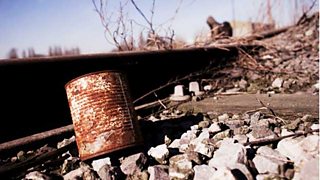
Laugh Track competition image.
��
One of my favourite things (apart from raindrops on roses and whiskers on kittens) is to be presented with a large pile of scripts.�� Like the late Geoffrey Perkins, I approach every script with the feeling that this will be the one, the game-changer, the next classic comedy.�� Although life is full of disappointment, the feeling of potential excitement never goes away.
So it was a real treat to spend a day with the entries for the �������� writersroom Laugh Track competition, along with writer, comedian and podcaster Danielle Ward, radio producer Victoria Lloyd, and writersroom luminaries Kate Rowland and Paul Ashton.
A previous sift had divided the scripts into four categories - yes, maybe yes, maybe no, and no -�� so our task was to provide second opinions and come up with, as it were, a long shortlist from which the final candidates would be chosen for a development workshop, leading to rewrites and the final showcase selection.
In the nature of things, people’s opinions of comedy, and of scripts, differ, so in the end the categories became fluid, with some scripts being promoted at the expense of others which were demoted.�� What we ended up with was a wide range of comedy styles, from old-style jokey shows to more contemporary pieces.�� Some scripts felt more or less like the finished article, while some had tremendous promise but betrayed the writers’ inexperience.
My three favourites, which I hope will make the final cut, were hugely diverse.�� One was a first script by a young writer who had come across the competition, undertaken a crash course in how to write a sitcom, and produced a piece that felt genuinely fresh and funny.�� The second, with a rather darker feel, was beautifully plotted and very surprising, albeit definitely post-watershed.�� And the third made brilliant use of a single setting.
However, for anyone who wants to enter other competitions, or indeed have their work taken seriously, there was some general lessons.
First, the requirement was for an audience sitcom, which means a show where stories are told in a limited number of sets, perhaps with some brief location filming, and recorded in front of an audience.�� Nothing could be clearer.�� So it was odd to find a number of scripts which couldn’t be made in front of an audience, and in some cases were sit-trag rather than sitcom.
Passing over the script which was obviously written in 2000 and plucked from the bottom drawer without any references being updated to 2012, several submissions were set in research stations at either pole, or in the jungle.�� It’s always useful to think about where produced shows are or have been set - home, office, workplace, and so on.�� If a setting hasn’t been used, then is it likely that no one else will have thought of it?�� Or is it more likely that the setting doesn’t work and is not in demand?
A piece of conventional wisdom is that sitcom characters are trapped, but this doesn’t mean that they have to be physically trapped, rather that they are trapped in their psychological situation.�� Harold Steptoe wanted to leave Albert, but he was stuck with a guilt-inducing father rather than unable to leave the scrapyard.
Another piece of conventional wisdom, which many entrants happily ignored, is that every script should have a story, and that the story should begin within the first three pages.�� Getting to page 15 without a clue of what was going on and what story I was being told was just depressing.�� Funny dialogue is fine, but it has diminishing returns if it’s just people being funny without a context.
And the final piece of conventional wisdom, which again shouldn’t really need re-stating, is that characters need to have their own voices.�� If everyone sounds the same, then it’s just the writer’s voice.�� There’s a venerable test - if you cover up the character names and just read the dialogue, can you tell who is speaking?�� If you can, the characters are clear.�� If you can’t, they’re not.
It was a treat to be back within the bosom of the ��������, particularly since we met in a rackety, decaying office of the old style, rather than in a section of an antiseptic, open plan floor, or a glass-walled meeting room with a jokey name and inadequate sound-proofing.
Congratulations to the writers who will be progressing, and the very best of luck.
Micheal Jacobs is a producer and script editor, and former head of the ��������'s College of Comedy.
